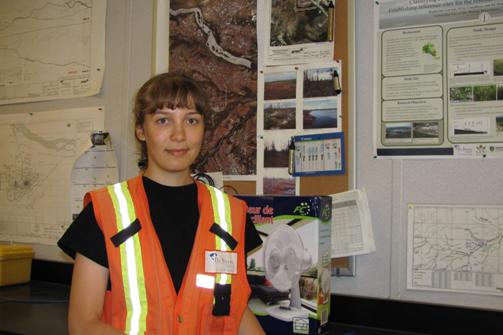
This article was provided by the Ontario Mining Association (OMA), an organization that was established in 1920 to represent the mining industry of the province.
Russian graduate student Yulia Orlova hopes to take lessons she is learning about muskeg at De Beers Canada’s Victor Mine home to better understand the dynamics of Siberian peatlands. She came to Canada last year and started her Masters in Geography at the University of Toronto. Ms. Orlova is researching the impact of mine dewatering and mercury in peatlands under the direction of U of T professor Brian Branfireun. This is one of the major research projects De Beers Canada’s Victor Mine is helping to sponsor.
The 26 year old native of St. Petersburg graduated from St. Petersburg State University with a degree in hydrology. She worked for three years both for the Russian government and a non-governmental environmental agency before continuing her studies in Canada.
“There is expertise in Canada on peatlands and funding support and there were more opportunities to do research in my area.” – Russian Hydrology Student Yulia Orlova
“I wanted to come to Canada to study here,” said Ms. Orlova. “There is expertise in Canada on peatlands and funding support and there were more opportunities to do research in my area.” To complete her thesis on the hydrology of the James Bay lowlands, she collects and tests water samples from streams around the mine site and carries out analysis of the results and examines water chemistry.
Along with the academic component of her studies, Ms. Orlova, like all students and professors on the Victor site, is regularly engaged in safety training and orientation sessions. The researchers are integrated into the mine’s activities and schedules and have full access to facilities such as the cafeteria and gymnasium. “I feel like we are part of the team,” said Ms. Orlova. “We are engaged in everything.”
While most Victor employees work on two week rotations at the mine site, researchers can find themselves at the mine site located 1,070 kilometres north of Toronto for longer spells. “I feel like I am a Victor resident. The first time I came here, I was on site for 45 days straight,” said Ms. Orlova. “This is a research centre, it is exciting. The more time I spend here, the more I like it. I don’t like the bugs but the people are great and it feels like home.”
Yulia keeps in touch with her parents and a younger brother back in St. Petersburg through e-mails and internet telephone technologies. When not at Victor, Ms. Orlova is usually in Toronto working and studying. “In Russia, you mainly see people of one culture,” she said. “I like Toronto and the variety. In Russia, you never see so many different people and cultures.”
Ms. Orlova is researching mercury mechanisms in the peatlands. Early results support environmental assessment findings. However, the work of Yulia and her fellow researchers and professors will not be completed until the five year program is concluded in 2012-2013.
The James Bay Lowlands, where the Victor Mine is located, is exceeded only by Western Siberia in Russia as the largest expanse of muskeg in the world. Ms. Orlova hopes to return to Russia with scientific knowledge learned in Canada that can be transferred to better understand and manage peatlands back home. When she returns to St. Petersburg, she will have two new academic degrees with her – one from the University of Toronto and the other from the University of Victor.
























